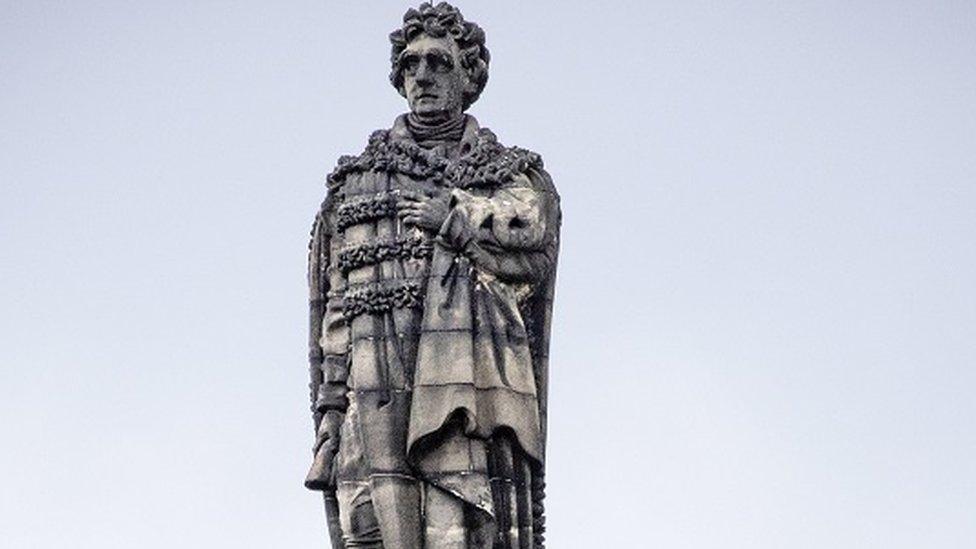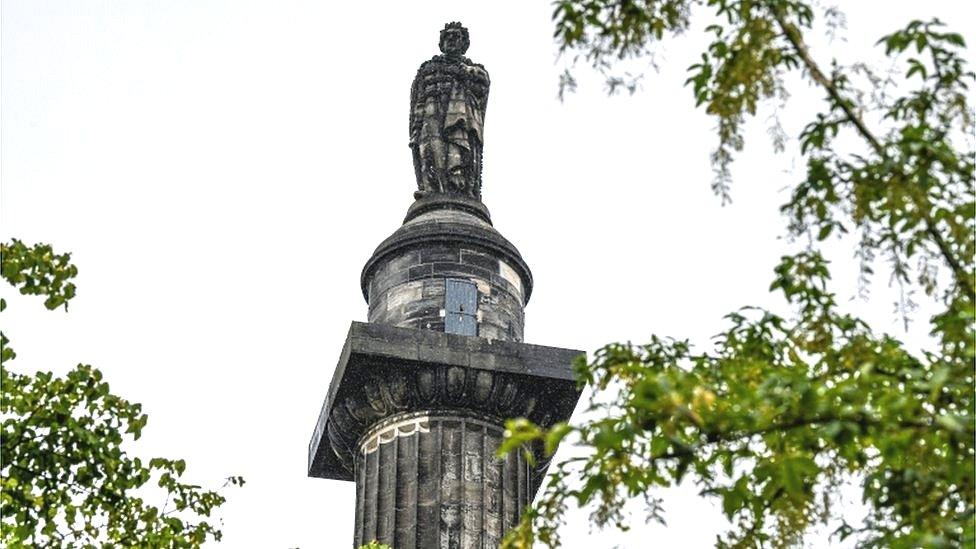Henry Dundas descendant defends ancestor's record
- Published

Bobby Dundas said his ancestor was a "politician of vision and integrity"
A direct descendant of Henry Dundas has said the slave trade would have been abolished decades later had it not been for his ancestor.
Bobby Dundas spoke out after a row about an 1827 statue of Henry Dundas.
It was reignited after anti-racism protests brought cities' colonial or slave-owning history to the forefront of public discussion.
Dundas' critics have said the MP's gradualist approach was instrumental in deferring the abolition of slavery.
A number of cities have been reviewing the way in which public statues glorify figures associated with slavery and the colonial era, after a series of Black Lives Matter demonstrations.
In Bristol, a statue of slave trader Edward Colston was removed by protesters.

The statue of Dundas sits on a tall column in St Andrew Square
Last week Edinburgh City Council proposed adding a plaque to the column in the centre of St Andrews Square, which the statue sits on, describing Henry Dundas as a "contentious figure" who was "instrumental in deferring the abolition of the Atlantic slave trade".
But Bobby Dundas said "any attempt to... [give] people the idea he was in favour of slavery would be a profound injustice".
He said that after a failed attempt by politicians to get the abolition of slavery through parliament, "the only way to get it abolished and a majority vote through parliament was to insert the word 'gradual' into the legislation".
He adds that had it not been for this amendment - made by Henry Dundas - the slave trade "could have been about for decades to come".
Bobby Dundas added that his ancestor was a "politician of vision and integrity" who had "no personal involvement in the slave trade".
'A lawyer with a sense of the possible'
Prof Brian Young, of Oxford University, has also written about Henry Dundas.
He described him as "a lawyer with a sense of the possible", who "saw that the immediate abolition of slavery was impossible: there were simply too many established interests".
Prof Young added that Henry Dundas inserted the word "gradual" into the legislative proposals to ensure it made it to the statute book and that slavery would ultimately be abolished.
"Anything other than this would have been a provocation that would have put back the cause of abolition by decades", he added.

What will the plaque on the column say?
The signage for the monument will say:
"This represents Henry Dundas, 1st Viscount Melville (1742 - 1811). He was the Scottish Lord Advocate and an MP for Edinburgh and Midlothian, and the First Lord of the Admiralty.
"Dundas was a contentious figure, provoking controversies that resonate to this day. While home secretary in 1792 and first Secretary of State for War in 1796 he was instrumental in deferring the abolition of the Atlantic slave trade.
"Slave trading by British ships was not abolished until 1807. As a result of this delay, more than half a million enslaved Africans crossed the Atlantic. Dundas also curbed democratic dissent in Scotland.
"Dundas both defended and expanded the British empire, imposing colonial rule on indigenous peoples. He was impeached in the United Kingdom for misappropriation of public money and although acquitted, he never held public office again.
"Despite this, the monument before you to Henry Dundas was funded by voluntary contribution from officers, petty officers, seamen and marines and erected in 1821, with the statue placed on top in 1827.
"In 2020 this was dedicated to the memory of the more than half a million Africans whose enslavement was a consequence of Henry Dundas's actions."

- Published11 June 2020
